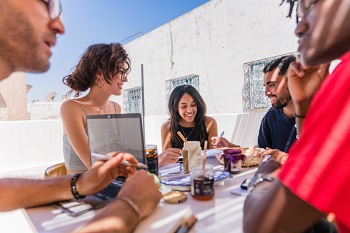Green Economy Program in the Philippines
Objective
-
€10mBUDGET
-
01/01/2024PROJECT START
-
54 monthsDURATION
According to a study by the French Parliament in 2020, the Philippines is one of the five countries responsible for over half of the plastic waste transported by oceans, with the volume of waste expected to double by 2050.
This EU-funded Green Economy Program in the Philippines aims to support the Philippines' transition towards a circular economy, prioritizing waste reduction as a fundamental aspect of their sustainable development efforts. It falls within the framework of the European Union's Multiannual Program 2021-2027 on Resilient Green Economy and Green Jobs and is part of the Team Europe Initiative (TEI) - Circular Economy and Plastic Waste.
The program aims to act across three levels with its overall goal of circular economy integration attainable through the implementation of the following specific objectives:
1) Improving circular waste economy and climate change policies and reduced GHG emissions (GIZ)
2) Enhancing practices of circular waste economy by the local government units in collaboration with the private sector and civil society sector, with focus on youth and gender equality (UNDP)
3) Enhancing engagement of the private and financial sectors into circular waste-reduction economy (Expertise France)
4) Increasing energy efficiency and renewable energy deployment
Strengthening the involvement of the private and financial sectors
As part of this programme to support circular economy in the Philippines, Expertise France is working more specifically on strengthening the engagement of the private and financial sectors in the circular economy and waste reduction.
In this way, the intervention will address challenges both upstream and downstream in the waste value chain, through business innovation and transformation to adopt more environmentally friendly practices, as well as actions to improve recycling rates.
Creating new partnerships
Expertise France will be implementing the action in partnership with the Global Green Growth Institute (GGGI) with the aim of submitting a joint technical proposal, with Expertise France as the lead organization. The GGGI is an international organization specialized in promoting green and sustainable growth, already well-established established in the Philippines having signed several cooperation agreements with various ministries (including the Ministry of Environment, Finance, and Economy). The activities in collaboration with the GGGI will provide support for mobilizing the financial sector and offering technical assistance to relevant stakeholders.
The Department of Trade and Industry will serve as Expertise France’s co-lead, ensuring effective coordination between the technical partner and the government agency relevant to the specific objective of the technical partner.Main project outputs
Expertise France will be focusing on three key outputs:
1- Support to the creation and growth of eco-enterprises which promote gender and social justice, through advocacy, capacity-building and financial assistance to support structures such as Entrepreneurial Supporting Organizations (incubators, accelerators...), business associations, etc.
This will involve strengthening the entrepreneurial ecosystem through the provision of technical expertise and financial assistance, to incubators, accelerators, Fab Labs, Design Centers and other support structures. The project will also support pilot testing of plastic waste reduction innovations and strategies in target sectors. Finally, this axis of activities will seek to build international networks between support structures working on circular economy issues in order to facilitate knowledge exchange and promote Philippine entrepreneurs to unlocked market and investment opportunities.
2- Support for green infrastructure projects which engage private sector actors in the circular waste management economy, by accompanying the development and execution of three Public Private Partnerships which delegate waste management services to the private sector and are inclusive of local MSMEs and entrepreneurs.
The second axis of actions focuses on supporting two public-private partnership projects in green infrastructure which delegate waste management services to the private sector. Expertise France will provide expertise and finance feasibility studies in order to accompany these projects from the planning and pipeline development stage, through the transaction phase. Complementary activities will also include support for green public procurement and development of a capacity-building program to support and formalise waste management workers.
3- Support to the financial sector for the allocation of circular/green economy-focused financing and acceleration of high-growth-potential innovation circular/green economy start-ups.
The GGGI will support various financial institutions, such as development banks and innovation investors. These actions will help standardize a common definition of the circular economy by clarifying eligibility criteria for various "green" financial products. Furthermore, GGGI's intervention will mobilize investors to finance the acceleration of 2-3 advanced green projects, as well as the development of 1-2 local facilities that regionalize technical and financial support for circular economy entrepreneurs.
The first Expertise France office in the Philippines
The launch of the Green Economy Program in the Philippines will be an opportunity to establish the first Expertise France team in the Philippines. The long-term team will be complemented by various experts in subjects such as sector-based circular economy business model development, as well as waste management infrastructure public-private partnerships which are ecologically- and gender-sensitive.


